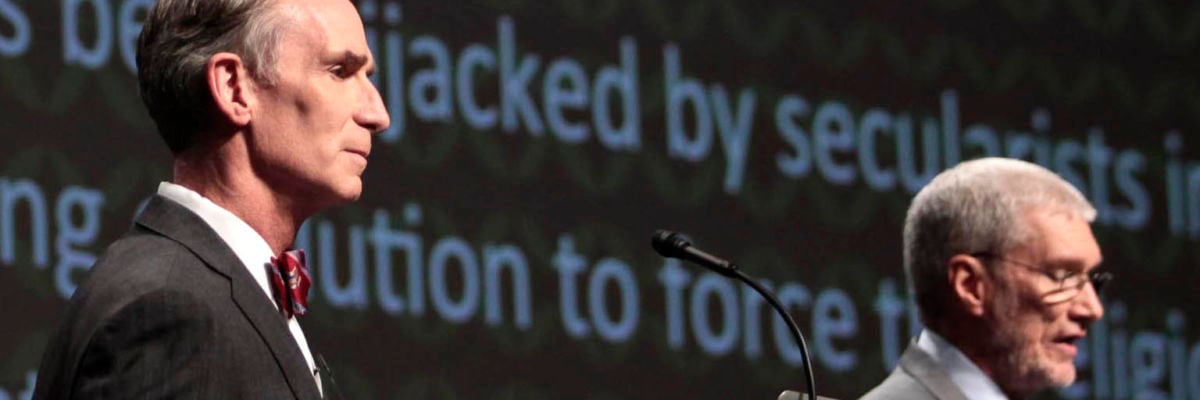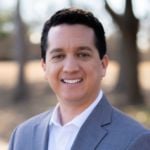
On Tuesday night the Kentucky-based Creation Museum hosted a debate on origins that over 500,000 people watched on the Internet. CNN”s Tom Foreman served as the debate moderator. Although there have been lots of creation/evolution debates in the past, this one generated extra excitement because of the high-profile status of the debaters.
Defending the young-earth creation (or YEC) perspective was Ken Ham, the president of Answers in Genesis. Defending the mainstream scientific account of evolution was Bill Nye, a.k.a. the “Science Guy,” who hosted a popular children’s educational television program during the mid-90’s and still works as an advocate for science education. The debate came about after Nye said that young-earth creationism was inappropriate for children, which didn’t go over well with the Answers in Genesis crowd. A debate was offered in response.
After watching it on YouTube, here are some of my thoughts:
A Risky Debate Topic for Ham: I was surprised that the official topic of the debate was, “Is creation a viable model of origins in today’s modern scientific era?” Normally YEC’s like Ken Ham try to put their opponents on the defensive by pointing out alleged gaps in the evidence for evolution without defending their own views. However, this specific topic forced Ham to defend the YEC claims for a young earth, worldwide flood, and a sudden and recent emergence of all life forms. In this case, it was Nye who trotted out data which seemed to contradict Ham’s “model.”
Nye pointed out that we have evidence from tree rings, ice core samples, biological diversity among species, radiometric dating, and starlight that is billions of light-years away all of which can only be explained if the earth more than 6,000 years old. Ham’s response to all of this was to say that Nye must assume things about the past in order for this evidence to count against the YEC hypothesis: for example, that ice layers grow at a standard rate, that atoms decay at a normal rate, and that the speed of light hasn’t changed over time. For Ham, there is only one assumption about the past we can reliably make, that the Bible accurately records it.
Two Kinds of Science, or One Kind?: Ham’s argument basically boiled down to the idea that there are two kinds of science: Observational science you can verify directly (like what you measure in a test tube) and historical science, which deals with facts about the past. According to Ham, everyone, including YEC’s, agree about observational science. However, since historical science can’t be directly observed we must make inferences about what happened in the past. As a result, we have to assume things about the past before we can analyze observable evidence that shows what happened. For Ham, this means starting with the assumption that the Bible is the word of God and that it literally describes the creation week. Any currently observable data simply fits within that assumption.
Nye, in contrast, starts with the assumption that the laws of nature are uniform and we can trust our senses. Nye countered Ham’s distinction between observational and historical science by noting that astronomy and criminal forensics are legitimate sciences even though they deal with events that happened in the past. I would add the example that even though I can’t observe the process of rust overtaking an abandoned car, I can scientifically determine that did happen by using observable evidence and common sense assumptions. For Nye, there is no reason not to trust our assumptions about the laws of nature that we use to explain what happened in the past, be it events that took place five minutes ago or five million years ago.
The Bible Says It, I Believe It, That Settles It: I was sympathetic to Ham’s argument that scientists must borrow from the Christian worldview in order to account for why science works. According to Ham, the Christian worldview explains why things like the laws of logic or the laws of physics are universal, unchanging, and ground the conclusions arrived at through science. Indeed, I believe the regularity of the universe’s natural laws is better evidence for God than the complexity found in living creatures, because the latter can be explained through evolution while the former cannot.
But what was bizarre about Ham’s approach is that not once during the debate did Ham explain why we should believe that the Bible can be trusted as a source about the past. Ham simply took the Bible as his starting point and ran with it. As he waxed eloquent about how Christ died for our sins, and flashed Scripture verse after Scripture verse on his PowerPoint, I kept thinking to myself, “I agree with you, Ken, but why would any non-Christian accept this?”
Rather than start with an assumption that the Bible is the Word of God, the Catholic approach to the inspiration of Scripture follows arrives at the conclusion that the Bible is the Word of God through a series of valid logical and historical inferences.
Civil Discourse is Possible: One thing I was extremely impressed with was Ham and Nye’s demeanor throughout the debate. There were no shouting matches or rude interruptions. Neither side took any “cheap shots,” and the harshest criticism was basically, “I’m not satisfied with that argument.” This is a great testimony to the fact that even if people passionately disagree about something, it is still possible for them to civilly engage their passionate disagreement.
Fear of a False Dilemma: I worried, and still do worry, that many people who watched this debate believed there are only two positions when it comes to the question of origins: naturalistic evolutionary biology or a literal interpretation of Genesis that holds that the entire universe was created in six days about 6,000 years ago. To his credit, Nye worked hard to not disparage religion in general, and said there were billions of religious people who don’t accept young earth creationism. Ham, in contrast, made it seem like it was his way or the highway. He challenged Christians who reject young earth creationism to explain how there could be death before the fall (Matt Fradd has actually addressed that subject here).
In contrast to the YEC view, the Catholic Church has no official position on scientific questions like the age of the earth or the evolution of life. Catholics are free to hold basically any position on those questions so long as they acknowledge that God directly created man’s immortal soul. (See our tract on the subject here.)
A Future Hope: I hope in the future there can be a public forum where a skilled defender of the Church’s position on creation and evolution can contrast that position with both the YEC view and atheistic evolutionary position. It would be a great opportunity to show that, as Pope John Paul II wrote in Fides et Ratio:
Even if faith is superior to reason there can never be a true divergence between faith and reason, since the same God who reveals the mysteries and bestows the gift of faith has also placed in the human spirit the light of reason. This God could not deny himself, nor could the truth ever contradict the truth.



